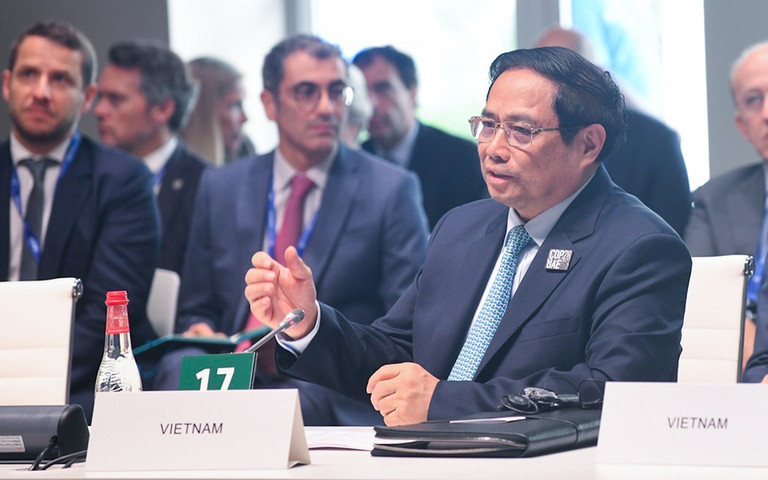
Dao Xuan Lai, head of UNDP's Climate Change and Environment unit, said he believes that Vietnam’s commitment on reducing net emissions to zero percent is attainable.
He noted that two years after Vietnamese Prime Minister Pham Minh Chinh made the commitment on zero percent net emissions at COP26, Vietnam set more specific and ambitious goals in its 2022 NDC (Nationally Determined Contribution), as well as a low-carbon development strategy.
The government of Vietnam has also launched action plans and programed sectoral development, including the national plan on deploying Glasgow Declaration on forests and the land use by 2030, aiming at strictly controlling natural forests, and preventing deforestation and land degradation; and an action plan to reduce methane emissions by 2030, in important sectors such as solid waste management, livestock, fossil fuel consumption and farming.
The action program on green energy transition and carbon and methane emission reduction of the transport sector, and the eighth national power development plan (Plan 8), and the national overall energy development strategy are also actions that concretize Vietnam’s commitments at COP26.
In December 2022, Vietnam became the third country approving JETP (Just Energy Transition Partnership) with G7, the EU, Denmark and Norway (IPG – Innovative Partnership Group).
“These are all turning points,” Lai said.
Prime Minister Pham Minh Chinh has set up JETP secretariat with four working groups under four ministries, including the Ministries of Natural Resources and the Environment; Planning and Investment; Finance; and Industry and Trade.
On December 1, 2023, at COP28 in UAE, Vietnam and IPG reached a consensus and officially announced the JETP resources mobilization plan.
Lai stressed that the amount of $15.5 billion pledged by IPG and GFANZ (Glasgow Financial Alliance for Net Zero) within JETP framework is an important initial step.
However, the financing is just a small contribution of the total financial resources needed for energy transition in Vietnam. The investment capital needed for Vietnam’s electricity industry development by 2030 alone is up to $134.5 billion.
Therefore, the terms and conditions of JETP’s financial resources need to be more attractive than loans in the market, in order to create a ‘catalyst’ for private investment.
Attractive investment market for green fields
According to Lai, in addition to energy transition, Vietnam has been actively participating in international negotiations, commitments and deployment of relevant conventions, such as approving the Global Biodiversity Framework adopted by CBD (Convention on Biological Diversity) countries at COP15.
Vietnam is conducting negotiations and making active contributions to the negotiation process for a legally binding convention on plastic pollution. It is also strongly promoting a green economy, circular economy and digital economy.
These efforts play a very important role in reducing greenhouse gas emissions, saving natural resources, mitigating pollution, and recovering biodiversity.
Vietnam is also making great efforts in institutional reform, creating a more transparent, more responsible, attractive and safer investment environment so as to attract both high-quality foreign investment and domestic investment.
International corporations and multinationals in developed economies consider Vietnam an attractive market where they can invest in green business fields, circular low-carbon economy and high technology.
Lai said that in order to speed up implementation of the commitment on zero percent net emissions by 2050, Vietnam needs to accelerate institutional reform, especially policies for the energy sector, investment and financing.
Vietnam needs to make heavy investment in research and deployment, and promote cooperation for technology transfer. Energy transitions need green technology and advanced technologies related to offshore wind power, solar panels, carbon collection, use and storage of carbon and green hydrogen.
Vietnam has been advised to organize training courses to improve skills and the quality of the workforce in the fossil fuel sector (coal mines, coal-fired power plants), so that workers can satisfy new required skills to be able to work in renewable energy and supply chains.
Chairman of AmCham John Rockhold said when listening to Prime inister Chinh’s speak at COP 28, he was impressed by the fact that Vietnam has completed Plan 8, which shows considerable progress since COP26.
He commented that with Plan 8, Vietnam has conveyed a clear message that the country wants to become a leader in renewable energy in Southeast Asia. The message can be seen as a sign of opening the door to businesses and investors.
Luong Bang